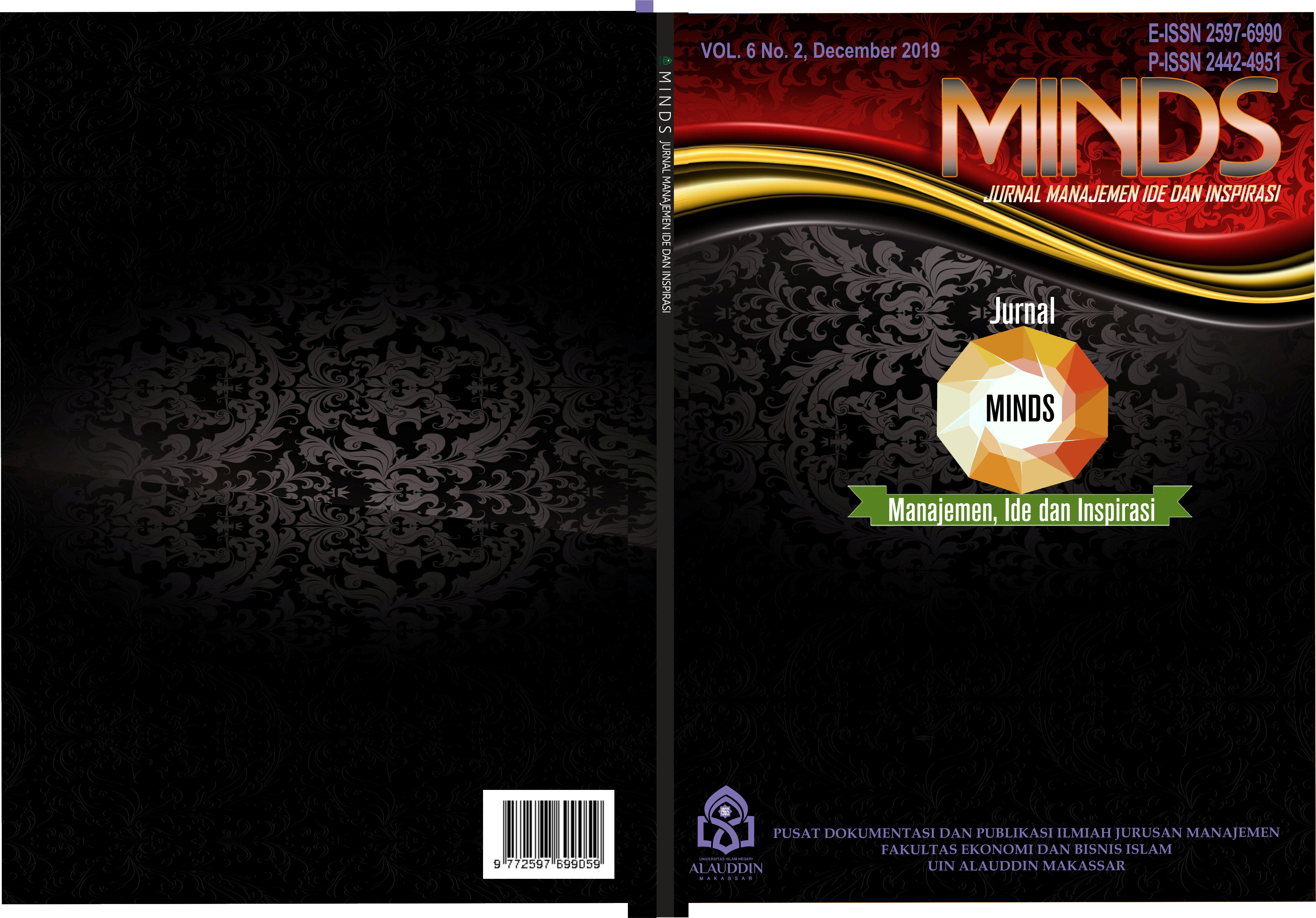Date Log
Transformational Leadership, HRM Competence, Information Technology, and the Performance of Public Service Employee
Corresponding Author(s) : Suriyanti Suriyanti
Jurnal Minds: Manajemen Ide dan Inspirasi,
Vol. 7 No. 1 (2020): June
Abstract
This study aims to analyze the effect of Transformational Leadership, human resource management competency, and Information Technology on employee performance, and information technology mediates the relationship between Transformational Leadership, human resource management competency on the employee performance. The study used data obtained from the purposive sampling of the employee in the south Sulawesi provincial education office (N=88). The result of this study showed that transformational leadership, HRM competence, and information technology, both direct and indirect have a significant effect on the performance of the South Sulawesi Provincial Education Office.
Keywords
Download Citation
Endnote/Zotero/Mendeley (RIS)BibTeX
References
Asmani, Jamal Ma’mur. (2011). Tips Pemanfaatan Teknologi Informasi dan Komunikasi dalam Dunia Pendidikan. Yogyakarta: DIVA Press.
Admin. (2017). Diklat Pengembangan Kompetensi Aparatur Sipil Negara
Andriopoulos, C. and Lewis, M.W. (2010), “Managing innovation paradoxes: ambidexterity lessons from leading product design companies”, Long Range Planning, Vol. 43 No. 1, pp. 104-122
Anwar, Prabu Mangkunegara. (2013). Manajemen Sumber Daya Manusia Perusahaan, Remaja Rosdakarya, Bandung.
Aragón-Correa, J.A., García-Morales, V.J. and Cordón-Pozo, E. (2007), “Leadership and organizational learning’s role on innovation and performance: lessons from Spain”, Industrial Marketing Management, Vol. 36 No. 3, pp. 349-359
Bangun, Wilson. (2012). Manajemen Sumber Daya Manusia. Jakarta: Erlangga. Handoko, Hani. 2012. Manajemen Personalia & Sumer Daya Manusia. Edisi 2. Yogyakarta: BPFE-Yogyakarta.
Bass, B.M. and Avolio, B.J. (2000), MLQ: Multifactor Leadership Questionnaire Technical Report, Sage Publications, Thousand Oaks, CA.
B. Uno,. Hamzah, Nina Lamatenggo. (2011). Teknologi Komunikasi dan Informasi Pembelajaran. Bumi Aksara. Jakarta
Calvo-Mora, A., Ruiz-Moreno, C., Picón-Berjoyo, A. and Cauzo-Bottala, L. (2014), “Mediation effect of TQM technical factors in excellence management systems”, Journal of Business Research, Vol. 67 No. 5, pp. 769-774.
Diklat PIM Tingkat IV (Tahun). LembagaAdmistrasi Negara R.I Jakarta. Hal 25.
Donate, M.J. and Sánchez De Pablo, J.D. (2015), “The role of knowledge-oriented leadership in knowledge management practices and innovation”, Journal of Business Research, Vol. 68 No. 2, pp. 360-370.
Gaol, L. Jimmy. (2014). Manajemen Sumber Daya Manusia. Jakarta: Grasindo
García-Morales, V.J., Matías‐Reche, F. and Hurtado‐Torres, N. (2008), “Influence of transformational leadership on organizational innovation and performance depending on the level of organizational learning in the pharmaceutical sector”, Journal of Organizational Change Management, Vol. 21 No. 2, pp. 188-212.
García-Morales, V.J., Lloréns-Montes, F.J. and Verdú-Jover, A.J. (2008), “The effects of transformational leadership on organizational performance through knowledge and innovation”, British Journal of Management, Vol. 19 No. 4, pp. 299-319.
Goldman, E., Wesner, M. and Karnchanomai, O. (2013), “Reciprocal peer coaching: a critical contributor to implementing individual leadership plans”, Human Resource Development Quarterly, Vol. 24 No. 1, pp. 63-87
Handoko, Hani. (2012). Manajemen Personalia & Sumer Daya Manusia. Edisi 2. Yogyakarta: BPFE-Yogyakarta.
Hasibuan, Malayu S.P. (2016). Manajemen Sumber Daya Manusia. Edisi Revisi. Jakarta: Penerbit PT Bumi Aksara.
Henry Simamora (2014). Manajemen Sumber Daya Manusia. Yogyakarta: Bagian Penerbitan Sekolah Tinggi Ilmu Ekonomi
Hoon Song, J., Kolb, J.A., Hee Lee, U. and Kyoung Kim, H. (2012), “Role of transformational leadership in effective organizational knowledge creation practices: mediating effects of employees’ work engagement”, Human Resource Development Quarterly, Vol. 23 No. 1, pp. 65-101.
Indica, I. (2013). Pengaruh Etos Kerja Islami Dan Gaya Kepemimpinan Transformasional Terhadap Komitmen Organisasional Dan Kinerja Karyawan. Jurnal Ilmiah Mahasiswa FEB.
Iqbaria M. and Tan, M. (Tahun) “The Consequences of Information Technology Acceptance on Subsequent Individual Performance”, Information & Management”. (Jurnal:Tempat)
Kartini Kartono. (2011). Pemimpin dan Kepemimpinan, Jakarta: PT. Rajawaligrafindo Persada.
Keran, Kristina Nugi. (2012), “Pengaruh Motivasi kerja, Kompetensi dan Kompensasi terhadap kinerja Karyawan Di Yayasan Bintang Timur Tangeran” Universitas Esa Unggul,Jakarta.
Lohmüller, B., & Petrikhin, A. (2018, June). The growing importance of technology executives/Hidden Chief Technology Officers and their organizational roles. In 2018 IEEE International Conference on Engineering, Technology and Innovation (ICE/ITMC) (pp. 1-8). IEEE.
Menguc, B., Auh, S. and Shih, E. (2007), “Transformational leadership and market orientation: implications for the implementation of competitive strategies and business unit performance”, Journal of Business Research, Vol. 60 No. 4, pp. 314-321
Raman, A., & Thannimalai, R. (2019). Importance of Technology Leadership for Technology Integration: Gender and Professional Development Perspective. SAGE Open, 9(4), 2158244019893707.
Rianisari, Anidiah. (2016). Mengembangkan Model Kompetensi. (Online), (http://www.jtanzilco.com/blog/detail/353/slug/meng embangkan-model-kompetensi), Diakses 29 Januari 2018
Rusman, dkk (2011) Pembelajaran Berbasis Teknologi Informasi dan Komunikasi : Mengembangkan Profesionalisme Guru. Jakarta: Rajawali Pers. PT. Raja Grafindo Persada
Senge, P.M. (1990), The Fifth Discipline: The Art And Practice of The Learning Organization, International Society for Performance Improvement, New York, NY.
Sumarno. (2010). Tingkat Adopsi Inovasi Teknologi Pengusaha Sentra Industri Kecil Kerajinan Gerabah Kasongan Kabupaten Bantul. Jurnal Manajemen Dan Wirausaha. https://doi.org/10.9744/jmk.12.1.pp.1-10
Simamora, B. H. (2013). Leadership for performance excellence. International Business Management. https://doi.org/10.3923/ibm.2013.247.257
Sutrisno, Edy. (2010). Manajemen Sumber Daya Manusia. Jakarta: Kencana.
Vermeeren, B., Kuipers, B. and Steijn, B. (2014), “Does leadership style make a difference? Linking HRM, job satisfaction, and organizational performance”, Review of Public Personnel Administration, Vol. 34 No. 2, pp. 174-195.
